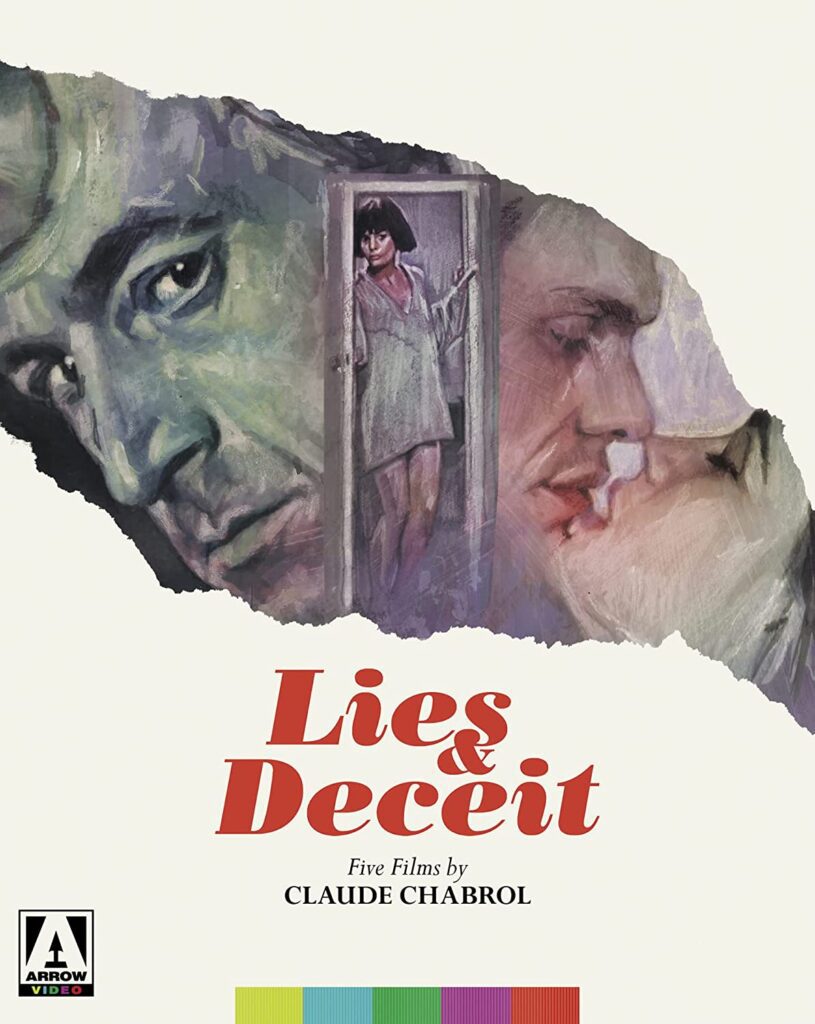
Arrow Video’s latest box set shines a light on the works of French New Wave director Claude Chabrol. Although he’s recognized as one of the key directors of the movement alongside contemporaries Jean-Luc Godard and Francois Truffaut, Chabrol’s work was typically more mainstream than his daring peers. True to form, the five films presented here are completely straightforward, pedestrian affairs without any hint of experimentation. They’re also limited to one decade of the prolific director’s 50-year career, the years 1985-1994.
The first two films follow the crime investigations of a gruff detective named Lavardin, played with brutal efficiency by Jean Poiret. He’s dogged in his pursuit of the truth, but also not above playing dirty to achieve his desired results. This character trait particularly comes into play in the second film, Inspector Lavardin, as he fights to protect the reputation of the murder victim’s wife when he discovers she’s his ex-lover. The plots in both this film and its predecessor, Cop au Vin, are wholly unremarkable, with little mystery and about as much pizazz as any episodic cop show of the era, so the chief enjoyment comes from watching Lavardin playing fast and loose with the rules of police conduct.
The production values take a big step up with Chabrol’s lush adaptation of Madame Bovary, especially thanks to the casting of screen legend Isabelle Huppert in the lead role. Chabrol presents a faithful telling of the classic tale, leaving little of his own mark on the material but giving Huppert wide berth to nail the character’s descent into depravity and condemnation. The period setting is beautifully recreated on screen with standout locations and costumes, making this a definitive adaptation of the book.
Betty is also an adaptation of a book, this time following a depressed barfly as she is rescued by a kindly woman who puts her up while she dries out. Chabrol structures this film with recurring flashbacks that slowly reveal what led to Betty’s drunken bender, as well as the aftermath of her self-destructive streak that results in her making the same mistake again. In a way, it’s a modern update of Madame Bovary, but with a touch of Hitchcockian intrigue as he toys with the slow reveal of her past and the full impact of her present actions. The editing isn’t quite as effective as it could be to avoid confusion with some flashbacks, but Marie Trintignant nails the difficult lead role and the concept is the most interesting of the set.
Torment closes the set with an unsettling look at a husband’s slow descent into jealous madness. Francois Cluzet plays a rustic hotel owner named Paul married to the impossibly beautiful Nelly (a luminous Emmanuelle Beart). At the start, they’re both incredibly happy in their marriage and their joint career running their hotel, but as time goes by Paul begins to suspect Nelly of having affairs with the guests. His doubts lead him to constantly trail her, imagine dalliances that never happened, and make outbursts in front of his guests, resulting in a gradual erosion of the hotel’s popularity and their marriage. Unfortunately, that’s really all there is to the plot, just a guy getting increasingly more jealous and possessive until the unsatisfyingly ambiguous ending. The casting is also a bit off, with the idea of the homely Cluzet being married to the iconic Beart incredibly hard to accept, something akin to Dustin Hoffman being married to Angelina Jolie. Of course that mismatch plays well into the jealousy, but suspension of disbelief is impossible.
All five films feature brand new digital restorations and are completely devoid of any perceptible defects. Titles have been corrected to eliminate judder, and lossless PCM audio tracks sound flawless, with mono for the first four and stereo for Torment as originally filmed. Colors do not appear to have been enhanced at all for the HDR era, retaining their subdued ‘80s-’90s hues, but maintain consistent contrast and brightness throughout all scenes.
Bonus features include select scene commentaries by Chabrol on all five films, along with other enlightening segments for each film. The best is undoubtedly an hour-long archival interview with Chabrol on stage at the National Film Theatre in 1994, a wide-ranging and free-wheeling conversation where he provides insight on his lengthy career. The box set also includes a fully illustrated 80-page collector’s book of new writing on the films by assorted critics.